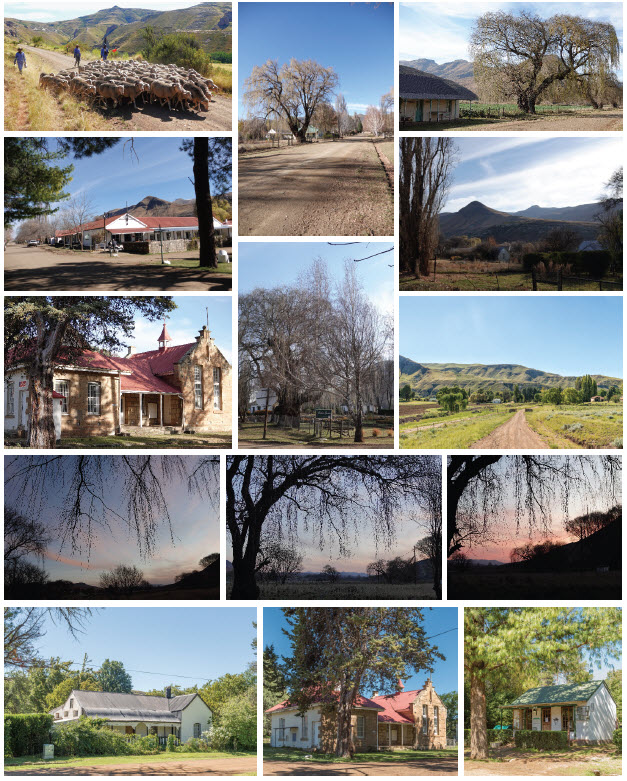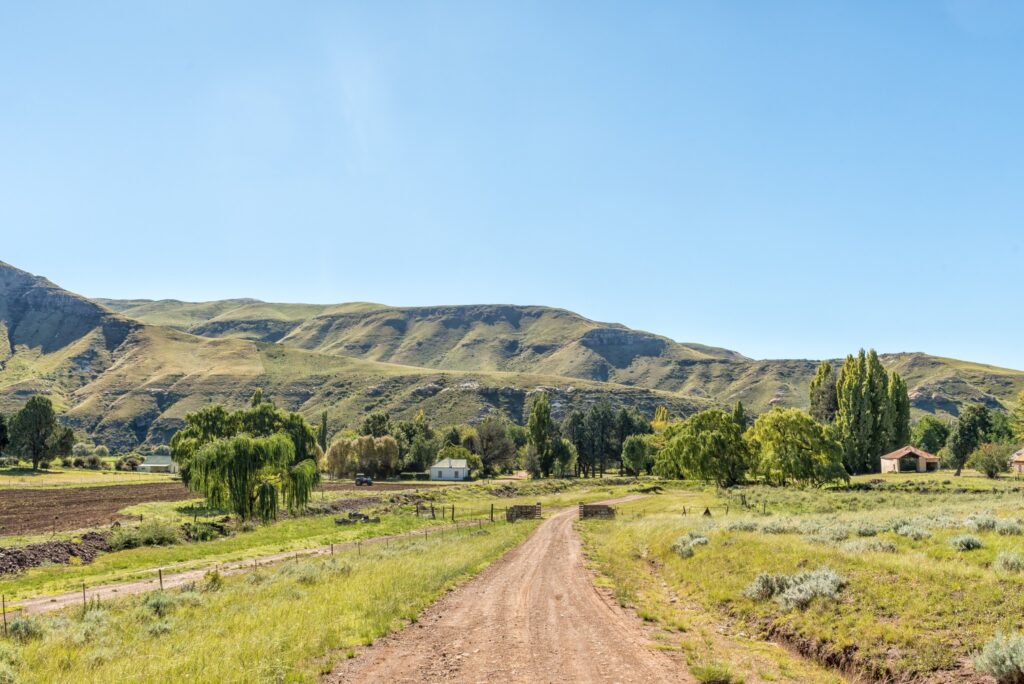“Here be dragons.” The tail of the dragon where the Drakensberg Mountain Range tapers off is unchartered territory for my husband and me as we prepare for a 2 000km return journey that will take us over gruelling gravel passes and through historic towns as we head for Rhodes in the Eastern Cape to join forty other fly-fishing enthusiasts at the annual Wild Trout Association Festival.
Our first stop is in Lady Grey, at a cottage named ‘Lupela,’ meaning “where the road ends.” It’s nestled at the bottom of steep mountainous slopes that appear to weep silent rivulets of tears. Lady Grey was named after the wife of Sir George Grey, Governor of the Cape Colony in 1854. A local legend tells the story that ”if Helen of Troy launched 1000 ships, Lady Grey turned a ship around in the middle of the Atlantic Ocean.” Her husband apparently accused her of having an affair with the captain, so Sir Grey ordered that his wife be off-loaded in Rio de Janeiro. There’s no record of when he went back to fetch her!”
Barkly East (1874), named after Sir Henry Barkly East (another Cape Governor), is our next stop. I settle on the stoep of ‘Balloch’ and lose myself in the magnificent view of a tumbling waterfall cascading down a majestic jade-green mountain into a lush green valley far below.
The threatening storm over the Drakensberg is grumbling and groaning like a dragon with indigestion and The Vlooikraal River is twitching and hopping like a flea.
I survey the slumbering dragon, puffing white steam after the downpour and watch as the dassies scamper over the blush-pink sandstone formations, heedless of the priceless Stone-Age San Rock Art under their feet.
There’s magic in the lure of fly-fishing and although the guys are fishing in solitude at one with the crystal-clear water and the crisp air, the camaraderie is tangible.
I scan the mountains in awe. Dinosaur fossils have been found here! Imagine that? Now I believe in angels and the truths that are hidden in myths and legends. I can also imagine faeries and dragons, for I have a wonderful imagination…but dinosaurs stomping above my head? Imagine that!
We head for the capital of fly-fishing’, the hamlet of Rhodes at the foot of Ben MacDhui, (the highest mountain in the Cape), 16km from the Mountain Kingdom of Lesotho, where more than 600kms of fishable streams, rivers and rapids beckon.
Rhodes is not one of those ‘don’t -blink- or- you’ll –miss- it –kind- of- places’ – For you can’t miss it! It lies nestled in a mountainous valley at the bottom of a gruelling gravel pass – and you won’t blink either – because you won’t be able to take your eyes off the dirt road that writhes like a worm on a hook. Here the span of the pass is not measured in kilometres, but in the time that it takes to navigate the bends, dodge the ruts, avoid the deep boggy patches, ford the low lying-bridges, manoeuvre around the cows, goats and sheep, and also to avoid driving over the occasional snake trying to get warm in the watery sunshine.
Our home for the next four days is a quaint century-old cottage, “The Hobbit.” A maze of low-lintels on inter-leading doors, step-ups and downs is warren-like and enchanting. An old iron stove heats the kitchen and a collection of beautiful, delicate Victorian china does not seem out of place. An enormous enamel bath with dragon-like clawed feet clutching a ball adds to the charm.

“It began long ago in a land far away to the east, the like of which you will not find in the world today…” How can one not quote JRR Tolkien? “The Land of the Middle Earth” is known to the locals as “The Centre of the Universe”…seriously!!
The entire village is a National Monument and I find the beautiful sandstone church (okay, one can’t get lost in Rhodes) with its Rossville plaque. The locals are keen to tell me the story that the village was originally called Rossville, in honour of Minister/Dominee Ross, an ex-pat from Scotland. However, the name was changed to Rhodes in the hopes that Cecil John Rhodes (Prime Minister of the Cape Colony 1890-1896 serving Queen Victoria) would send some of his millions their way as a thank you for the honour they bestowed upon him. Apparently Rhodes only sent a tray of pine seedlings in acknowledgement.
Minister/Dominee Ross, who regardless of his British birth, was interned during the Anglo-Boer War in the Aliwal North Concentration Camp. After his release, barefooted and clothed in rags, he walked back to his home. Prior to the war, he conducted the church services alternatively in English and in Afrikaans. But his disgust with the British was so great that he never ever preached in English again!! Now Rhodes hosts a “Stoepsitfees”, where one is issued with a “Passport of Participating Stoeps”, and so one wends one’s way through the village and surroundings, stopping to sit on a stoep to chat, sip tea (or something stronger), ‘dunk an ouma’ and most importantly, to pick up a pair of knitting needles to knit a square for a blanket. (Even I could manage that). Passports are stamped, and the knitted squares are made into blankets for the elderly. I just missed the ‘fees’ but I got into ‘stoepsit’ mode regardless and stopped to chat to all.
I asked about the delicate bell-like pink flowers growing wild along the verges. I got a variety of answers: angel’s fishing rods, grasklokkies and harebells — bells that the faeries tinkle to warn the hares of danger — “you gotta love this place.”
So, in ‘stoepsit-mode’ I sat on my own stoep, sipping ginger tea from delicate Victorian china. My first visitor was a small boy sitting astride a donkey. He told me that his name is ‘Abram’ and that he has a new sister. I ask about her name. He shrugs his thin shoulders, “net Sussie.” So I ask about the donkey’s name – “Gautrain!” His peals of laughter reveal the gaps in his baby teeth as he kick-starts his ‘Gautrain’.
“Never laugh at live dragons”… there’s real danger here in the Centre of the Universe.


